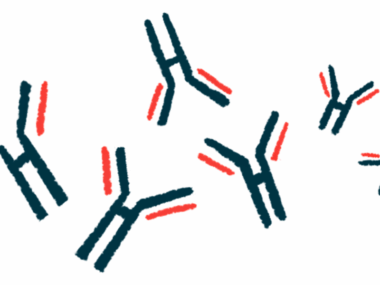Blood test may predict Parkinson’s disease years before symptoms
8 proteins ID'd that may factor in inflammation, Lewy body formation
Written by |

Researchers at University College London (UCL) have developed a test that accurately identified Parkinson’s disease up to seven years before its symptoms manifested by measuring levels of eight biomarkers in the blood, a study reports.
“We set out to use state-of-the-art technology to find new and better biomarkers for Parkinson’s and develop them into a test. Parkinson’s UK funding was integral to the development of this test,” Kevin Mills, PhD, of UCL Great Ormond Street Institute of Child Health, said in a press release.
“Such biomarkers would advance population-based screenings to identify individuals at risk and who could be included in upcoming prevention trials,” the researchers wrote in “Plasma proteomics identify biomarkers predicting Parkinson’s disease up to 7 years before symptom onset,” which was published in Nature Communications.
Diagnosing Parkinson’s early is challenging because its motor symptoms may not appear until years later. However, “as new therapies become available to treat Parkinson’s, we need to diagnose patients before they have developed the symptoms,” Mills said.
Here, researchers used a technique called mass spectrometry to identify biomarkers in the early stages of the disease by comparing the blood of 10 patients and 10 healthy people. A total of 47 proteins were found at different levels in the two groups.
Using machine learning, a form of artificial intelligence, the number of biomarkers was narrowed down to eight proteins that may factor in inflammation and forming Lewy bodies, that is, toxic clumps that build up in the brains of people with Parkinson’s.
Measuring levels of eight biomarkers
A test combining all eight biomarkers was 100% accurate at identifying Parkinson’s in 99 people (49 men) who’d been diagnosed with the disease. As controls, the researchers used blood samples from 36 healthy people.
“The findings add to an exciting flurry of recent activity toward finding a simple way to test for and measure Parkinson’s,” said David Dexter, PhD, the director of research at Parkinson’s UK.
To see if the test could predict who might develop Parkinson’s, the researchers analyzed 146 blood samples from 54 people with rapid eye movement sleep behavior disorder (RBD), a sleep disturbance that often precedes Parkinson’s.
All had RBD confirmed by sleep studies and 48 (88.9%) had a reduced sense of smell, another common nonmotor symptom of Parkinson’s that often occurs alongside RBD. Most (91.7%) tested positive on a seed amplification assay that detected alpha-synuclein, the protein that forms toxic clumps in Parkinson’s.
Participants were followed for up to 10 years. During this period, 11 received a diagnosis of Parkinson’s disease and five developed dementia with Lewy bodies, which exhibits symptoms similar to Parkinson’s. The eight-biomarker test correctly identified 79% of the samples as similar to those from people diagnosed with Parkinson’s, predicting the disease onset between 7.3 and 0.9 years before a diagnosis.
“With more work, it may be possible that this blood-based test could distinguish between Parkinson’s and other conditions that have some early similarities,” such as dementia with Lewy bodies, Dexter said. “This is an important next step.”
By finding people at risk for Parkinson’s sooner, they may be included in clinical trials aimed at preventing or slowing down the disease, the researchers said. This could lead to better treatments and improve the quality of life for those people.



